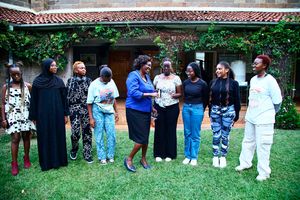Women MPs’ quest for House seats shot down

Photo/ FILE
Women MPs consult at the Kenya Institute of Administration on March 20, 2010 as lawmakers sought consensus on the draft Constitution. Kenya’s constitution states that there will be 47 women in National Assembly, each elected from the counties.Women MPs last Thursday demanded more seats in the 27 parliamentary committees in accordance with the one-third representation rule in the Constitution.
Women MPs last Thursday demanded more seats in the 27 parliamentary committees in accordance with the one-third representation rule in the Constitution.
They engaged their male colleagues in the House in a heated debate but lost after the male MPs argued that they lacked the numbers that to make the one-third representation rule a reality.
Deputy Speaker Farah Maalim, while acknowledging the need for gender parity in House committees, said it was not possible for the small number of female MPs to serve in all the committees of the House.
“The chair appreciates the quality of performance and input of the female MPs, but it is not humanely possible for 10 or nine members to serve in 27 committees,” he said.
There are 22 women MPs, representing about 10 per cent of the total 222 membership.
Twelve of them are serving in the Cabinet, leaving only 10 backbenchers who are qualified for membership in parliamentary committees.
The reconstitution of the parliamentary Constituency Development Fund Committee also degenerated into an argument of legality as the House was split down the middle on whether or not its term had come to an end.
New names
The House Business Committee had proposed reconstitution of the CDF committee under the CDF Act proposing 11 new names which were approved in the end.
The HBC nominations also included the names proposed for inclusion in the Public Accounts Committee, Local Authorities Committee, Committee on Implementation of the Constitution and the HBC itself.
The names were proposed through a motion moved by deputy leader of Government Business Mr Amos Kimunya, whose speech was cut short by numerous points of order from MPs contesting the legality of the reconstitution of the CDF committee and why the reconstitution did not reflect the one-thrid women representation rule.
Gichugu MP Martha Karua, Sotik MP Dr Joyce Laboso, Nominated MPs Millie Odhiambo, Sophia Abdi and Rachael Shebesh argued that the one-third rule was a constitutional requirement and asked Parliament to lead by example in ensuring that the Constitution is upheld.
But Dr Laboso was put on the spot for having earlier declined a position in the HBC.




